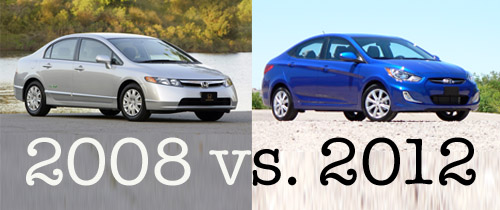The Crank: Are today’s “subcompacts” yesterday’s “compacts”?
 By John LeBlanc
LAS VEGAS, Nevada – You can’t judge a book by its cover. And you can’t judge a car by its segment name. At least not anymore. That’s the conclusion I’ve come to after spending a day driving Hyundai’s new 2012 Accent, a so-called “subcompact” that, for all intents and purposes, offers the size, features and performance of what you and I would regard as a “compact”, by far, the most-popular new car segment in this country.
Not convinced? Lets put the new Accent four-door sedan up going what’s been the Gold Standard, the King of the Canadian Compacts for more than the past decade: the ubiquitous Honda Civic sedan. For instance, let’s say you own an out-of-warranty 2008 Civic DX. And you’re looking for a brand new replacement. Don’t be fooled by the Accent’s “subcompact” ranking. It essentially matches or betters the “compact” Honda in almost every measurable category.
The 2012 Accent has essentially the same horsepower (138 vs. 140) and lb-ft of torque (123 vs. 128), respectively, as the '08 Civic DX. But because Hyundai has employed more technology, the Accent’s 1.6-litre four (with one more gear in both its manual and automatic gearboxes than the Honda's five-speeders) and has a lighter curb weight, it delivers better fuel economy (6.9L100 km city, 4.8L hwy, compared to 8.2L and 5.7L) than the Civic's 1.8L unit.
Exterior dimensions are similar. But the Accent has a larger trunk and offers more overall interior volume. And the base model '12 $13,999 Accent L delivers more standard kit than an originally priced $16,990 '08 Civic DX, with the likes of stability and traction control, power locks, and iPod audio connections standard. (Before you fire up your emails, I know, a previously enjoyed 2008 Civic DX, with 80,000 kms, goes from $8,600 to $10,725.)
But don't blame Hyundai solely for confusing the car size category naming hierarchy.
“Compacts” like the Chevrolet Cruze, Volkswagen Jetta and the Accent’s big brother Elantra, offer the room and comfort of what used to be considered “midsize” sedans. Or take the new “midsize” 2012 VW Passat I recently tried. It’s been enlarged to now compete against “full-size” cars like the Chrysler 300.
So be warned: Before you go looking for a replacement for your old "compact", best to consider a new, super-sized "subcompact". It may be all the car you really need.
By John LeBlanc
LAS VEGAS, Nevada – You can’t judge a book by its cover. And you can’t judge a car by its segment name. At least not anymore. That’s the conclusion I’ve come to after spending a day driving Hyundai’s new 2012 Accent, a so-called “subcompact” that, for all intents and purposes, offers the size, features and performance of what you and I would regard as a “compact”, by far, the most-popular new car segment in this country.
Not convinced? Lets put the new Accent four-door sedan up going what’s been the Gold Standard, the King of the Canadian Compacts for more than the past decade: the ubiquitous Honda Civic sedan. For instance, let’s say you own an out-of-warranty 2008 Civic DX. And you’re looking for a brand new replacement. Don’t be fooled by the Accent’s “subcompact” ranking. It essentially matches or betters the “compact” Honda in almost every measurable category.
The 2012 Accent has essentially the same horsepower (138 vs. 140) and lb-ft of torque (123 vs. 128), respectively, as the '08 Civic DX. But because Hyundai has employed more technology, the Accent’s 1.6-litre four (with one more gear in both its manual and automatic gearboxes than the Honda's five-speeders) and has a lighter curb weight, it delivers better fuel economy (6.9L100 km city, 4.8L hwy, compared to 8.2L and 5.7L) than the Civic's 1.8L unit.
Exterior dimensions are similar. But the Accent has a larger trunk and offers more overall interior volume. And the base model '12 $13,999 Accent L delivers more standard kit than an originally priced $16,990 '08 Civic DX, with the likes of stability and traction control, power locks, and iPod audio connections standard. (Before you fire up your emails, I know, a previously enjoyed 2008 Civic DX, with 80,000 kms, goes from $8,600 to $10,725.)
But don't blame Hyundai solely for confusing the car size category naming hierarchy.
“Compacts” like the Chevrolet Cruze, Volkswagen Jetta and the Accent’s big brother Elantra, offer the room and comfort of what used to be considered “midsize” sedans. Or take the new “midsize” 2012 VW Passat I recently tried. It’s been enlarged to now compete against “full-size” cars like the Chrysler 300.
So be warned: Before you go looking for a replacement for your old "compact", best to consider a new, super-sized "subcompact". It may be all the car you really need.
06.30.11 | 2012, Hyundai, News | Comments Off on The Crank: Are today’s “subcompacts” yesterday’s “compacts”?




